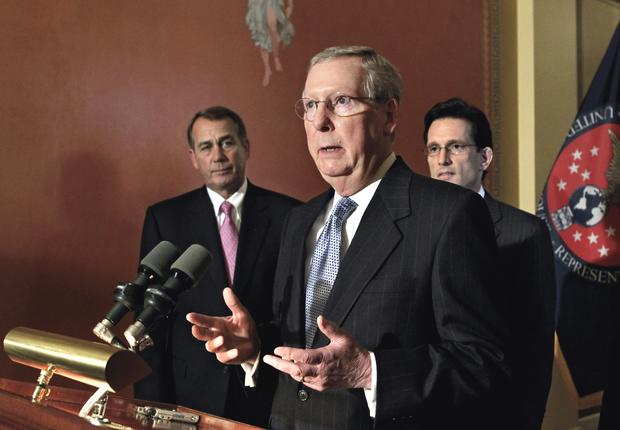Winners and Losers in the McConnell back-up plan
It's hot and steamy today again in Washington, and like the last few days, the coldest room in town is most likely the Cabinet Room at the White House where President Obama and Congressional leaders will meet again to try to solve the debt debacle. But there is new optimism this morning based on a proposal to end the stalemate from an unlikely source.
Senate Republican Leader Mitch McConnell, who this week said it was his "single most important political goal" to see President Obama defeated in 2012 and said a "real solution" was impossible with President Obama in the Oval Office, came out with a true compromise plan. In a nutshell, it gives President Obama the ability to raise the debt ceiling without relying on Republicans and without actually cutting spending. The White House would have to identify trillions of dollars in possible cuts to federal spending, to offset the raise of borrowing authority, and Congress could vote on those cuts, but the president could veto those cuts and the debt limit would still rise. The driving idea is that the default is not a realistic solution, so what can Republican extract from Mr. Obama? Congress gave itself the ability to raise the debt ceiling, and theoretically they can give it away, but if it passes, and that's a big IF, who wins and who loses with the plan?
President Obama
Here's what he wins:
-While warning to CBS's Scott Pelley about the possibility of missed Social Security checks, Mr. Obama would get what he most desperately needs right now, which is avoiding default. That's his biggest short term goal.
-He's able to avoid massive cuts in the short term which could cut public sector jobs and increase unemployment in the short term.
-He's also able to raise the debt ceiling without cutting Medicare or Social Security, which preserves the political argument for Democrats opposing Republican plans to make major changes to those programs.
Here's what he loses:
-Loses the ability to craft the "grand bargain" - the moderate, pragmatic $4 trillion plan that would solve the debt crisis and put the country on solid footing and show he's serious about cutting spending at the same time.
-He owns the debt ceiling increase - he is solely responsible for government spending
-He loses the ability in the short term to raise any taxes to cut the debt.
-The debt process is drawn out throughout the campaign season. The White House had hoped to get the deal done and locked in this year to avoid the topic in 2012, when voters decide whether to give Mr. Obama a second term.
Congressional Democrats
Wins:
-Gets the debt ceiling raised, avoids default, and preserves their argument against Republicans over cutting Medicare.
Losses:
-Have to take difficult votes after votes on cutting spending
-Takes away leverage to raise taxes on the wealthiest Americans and close corporate loopholes
Senate Republicans
Wins:
-Saves the Republican party from having to own all the blame for default
-Keeps the political issue of Mr. Obama being a big spender alive through the 2012 election
-Keeps political issue of Mr. Obama being not serious about cutting the debt alive too
-Allows Republicans to never have to vote FOR raising the debt ceiling
-Prevents any tax increases or closing or corporate tax loopholes
Losses:
-No ability to enforce spending cuts, no way to achieve trillions in cuts
House Republicans
Wins:
-Like the Senate GOP, they avoid ownership of blame, they keep the issue alive and they avoid having to vote for more debt
-Prevents any tax increases
Losses:
-Cuts. And this is the big one. The House GOP wants significant spending cuts. Many don't believe the White House and their own leadership on the consequences of a default and as a group, they appear to be incredibly resistant to raising the debt ceiling without cuts, regardless of the politics.
In the End
For McConnell, a smart political tactician, this debate has often been about politics over policy. While spending cuts are key to most Republicans, McConnell's proposal would keep the idea of cuts alive for another day which allows the Republicans to use the issue as a political weapon against the president and his party. McConnell is trying to take back control of the Senate and with 23 Senate Democratic seats open, he has a real chance. Keeping this issue alive through the election would only help his chances of winning back control for Republicans.
The White House and congressional Democrats get the debt ceiling raised, which they need more than they want, and even though they would hold the political hot potato of more debt, their arguments about national priorities in terms of spending, on education, entitlements, investment, would be in place through the election.
The plan is true compromise, each side loses something and each side gets something. While many accuse McConnell of just kicking the debt can down the road to be settled another day, keeping the politics of debt alive is only a good thing for the Republican party. While spending cuts will have to wait for another day, preventing a political victory from the White House, while avoiding default, is a trade off that Republicans will have to decide if it's one worth making.
